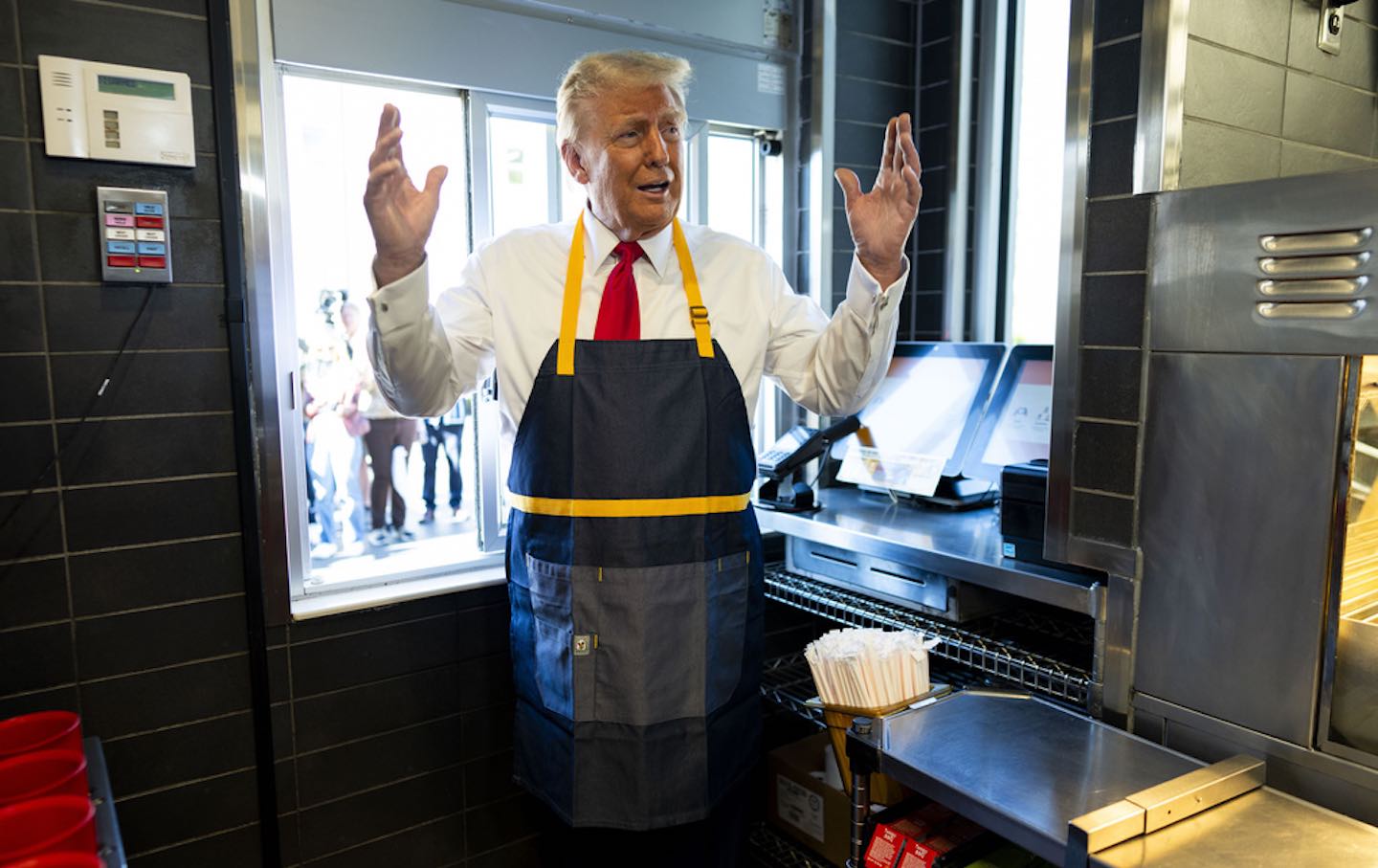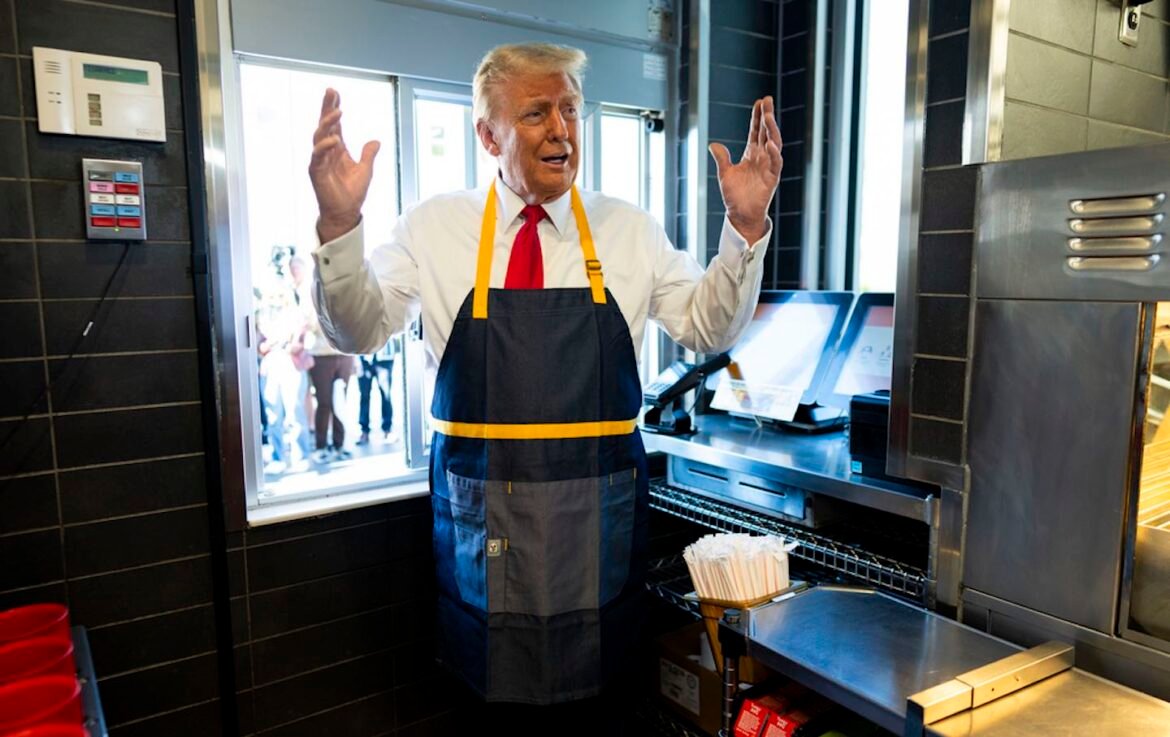The former president has always pretended to identify with working-class voters. Yesterday, at a campaign stop in Pennsylvania, he pretended to be one of them.

Donald Trump stands at a drive-thru window during a campaign stop at a McDonald’s in Feasterville-Trevose, Pennsylvania, on Sunday, October 20, 2024.
(Doug Mills / The New York Times via AP, Pool)
As Donald Trump has begun to lose ground among his most robust base of support—non-college-educated white voters—he’s hit upon the sort of strategic appeal that comes naturally to a reality-TV has-been: He decided to cosplay as one of them. On Sunday, Trump donned an apron at a McDonald’s franchise in Bucks County, Penn., to briefly pretend to work the french-fry station.
The episode was a Potemkin spectacle—the franchise was actually closed to customers for the photo-op, and the customers Trump pretended to serve were MAGA supporters pre-vetted by the Secret Service; those faux customers even did trial runs through the restaurant’s drive-thru lane in advance of Trump’s star turn. Trump and his team had been touting his appearance over the past week as a means of trolling his Democratic rival, Vice President Kamala Harris, who has referred to her own summer job at a Bay Area McDonald’s in 1983 as part of her middle-class upbringing. Trump has branded Harris’s claim a lie without offering any evidence for disbelieving it—so when his stint behind the fryers was over, he bragged that he’d worked at McDonald’s 15 minutes longer than Harris has.
Beneath the demented exercise of sending up a putative campaign lie with a make-believe photo-op, Trump’s campaign stunt points up a deeper, more distressing truth about America’s persistent failure to think straight about social class in an age of steep inequality: The experience of working for a living is all too often a purely symbolic floating signifier in our public life, something that is glibly taken up and discarded by on-the-make meme-hustlers and demagogues who contribute nothing to the actual productive life of the country.
Consider as an edifying point of contrast another hoary piece of food-based campaign performance art: the effort to court ethnic voting blocs by chowing down on their trademark cuisines. These pandering photo-ops come with built-in guardrails: Candidates would never presume to make the fare that they’d been eating, since that would be a first-order breach of cultural authenticity. And they’d be far less likely to dress up and act like members of these coveted ethnic constituencies, since that would be a simple act of political suicide.
None of these bright-line warnings apply to the practice of social-class minstrelsy on the campaign stump, however. Ever since the Jacksonian age, the log-cabin myth has granted candidates carte blanche to play down their actual socioeconomic origins in pursuit of broad-based political support. That’s how scions of great wealth such as Franklin Roosevelt and John F. Kennedy were able to campaign as improbable tribunes of the plain working people.
Yet even by these already debauched standards of class representation, the Trump moment marks a dramatic escalation in the propulsion of class-themed campaign appeals into the land of make-believe. Trump is another son of privilege who’s thrust himself into the role of savior of forgotten American workers—yet he has continued to govern like a rapacious mogul, delivering tax cuts for the wealthy, cracking down on workers’ collective bargaining protections, and reneging on his pledges to rescue American manufacturing plants. In his recent appearance before the Economic Club of Chicago, he ignorantly derided the demanding jobs of line workers in auto plants, and at a rally in Erie, Pennsylvania., he bragged about withholding overtime pay from contract workers he’d hired.
Yet, in the midst of all this, the phony symbolic appeals to workers continue senselessly piling up. Indeed, just prior to LARPing as a McDonald’s fry cook, Trump made a campaign stop in Latrobe, Pennsylvania, to reprise his pretend role as a heroic savior of American industry; he donned a safety helmet to woo Keystone State steel workers, and then proceeded to riff on the majesty of golfer Arnold Palmer’s manhood.
The squalid and slapdash character of Trump’s working-class play-acting is a symptom of the broader culturalization of American class politics. In the upside-down world of symbolic class confrontation, cultural preferences are an all-purpose stand-in for class identity. Trump is well positioned to exploit this bogus brand of class identity, since despite being to-the-manner born, his taste in all things cultural is not particularly highbrow. Members of his political cult have rallied to claim higher fast-food authenticity for their candidate because the billionaire real estate scion is such a prodigious consumer of the McDonald’s product line. In a Fox News appearance last week, Donald Trump Jr. bragged that his dad “knows the McDonald’s menu far better than Kamala Harris ever did”—a claim to expertise that’s roughly equivalent to Trump père claiming a judgeship because of his status as a frequent litigant and civil and criminal defendant before the courts. Still flush from his exhilarating tour at the fry baskets, Trump brandished a “french fry certification pin” at a visit to inspect hurricane devastation at Asheville, North Carolina—the same site where he disclaimed any responsibility for promoting the conspiracy rhetoric that has spurred vigilante gunmen to face down FEMA workers in the field.
That’s the thing about a culturalized class politics: Absolutely anyone can play, on the basis of any sort of ad hoc authenticity they decide to take up at the moment. That’s why it made zero impact on the coverage surrounding Trump’s McDonald’s photo-op that the owner of the franchise had long fought paying proposed increases in Pennsylvania’s minimum wage, and has been the site of repeated labor protest actions. Instead, outlets like The New York Times witlessly treated the Bucks County stunt as just more savvy positioning for the blue-collar vote, while MAGA-addled pundit Piers Morgan marveled that the spectacle of Trump behind the fry station was “was not just hilariously funny, it was also a powerful connective link to regular voters.”
Trump’s not the only ruling-class reactionary rushing to advertise himself as a proletarian fellow traveler. Just as the Republican nominee was wrapping up his whirlwind tour as a pretend worker this past weekend, Elon Musk elevated a stunningly obtuse tweet from fellow Silicon Valley billionaire and Trump campaign bankroller Marc Andreessen bemoaning the supposed aversion of liberal Democrats to open political debate that mockingly echoed social justice rhetoric. “When you’re accustomed to privilege,” Andreessen said, addressing those who attribute bias to Musk’s content moderation on X, “equality feels like oppression.” Not only is Musk the richest man in the world—he’s also bankrolling a significant tranche of the Trump campaign’s GOTV effort, transforming the X social media platform into a nonstop guignol of Trump-stanning, and is now offering $1 million awards to registered voters signing on to his MAGA petition drive, in a stark violation of both existing campaign finance law and non-plutocratic political mores. If you think that Musk, Andreesen, or anyone else in the upper reaches of the Trumposphere is either battling privilege or suffering oppression, I’ve got a large order of fries to sell you.
Can we count on you?
In the coming election, the fate of our democracy and fundamental civil rights are on the ballot. The conservative architects of Project 2025 are scheming to institutionalize Donald Trump’s authoritarian vision across all levels of government if he should win.
We’ve already seen events that fill us with both dread and cautious optimism—throughout it all, The Nation has been a bulwark against misinformation and an advocate for bold, principled perspectives. Our dedicated writers have sat down with Kamala Harris and Bernie Sanders for interviews, unpacked the shallow right-wing populist appeals of J.D. Vance, and debated the pathway for a Democratic victory in November.
Stories like these and the one you just read are vital at this critical juncture in our country’s history. Now more than ever, we need clear-eyed and deeply reported independent journalism to make sense of the headlines and sort fact from fiction. Donate today and join our 160-year legacy of speaking truth to power and uplifting the voices of grassroots advocates.
Throughout 2024 and what is likely the defining election of our lifetimes, we need your support to continue publishing the insightful journalism you rely on.
Thank you,
The Editors of The Nation

